-
 Art of Wellness Acupuncture & Traditional Chinese Medicine (TCM)11704 Wilshire Blvd, Suite 295, Los Angeles, CA, 90025
Art of Wellness Acupuncture & Traditional Chinese Medicine (TCM)11704 Wilshire Blvd, Suite 295, Los Angeles, CA, 90025
myartofwellness@gmail.com310-451-5522 Office Hours
MonClosedTue7:30 am --4 pmWed7:30 am --4 pmThu7:30 am -- 4 pmFri7:30 am -- 4 pmSat7:30 am -- 4 pmSunClosedOur office opens from Tuesdays to Saturdays 7:30 am to 4 pm, will be closed on Memorial day, Independent day, Labor day, Thanksgiving day, Christmas and New year.
-
Recent Posts
- Chinese New Year 2026: Year of the Horse
- Acupuncture and TCM Treatment for Perimenopause Symptoms
- How to Treat Insulin Resistance With Acupuncture and TCM
- How to Treat Metabolic Syndrome With Acupuncture and TCM
- How to Treat Syncope With Acupuncture and TCM
- How to Treat Thoracic Outlet Syndrome With Acupuncture and TCM
- How to Treat Dupuytren’s Contracture With Acupuncture and TCM
- How to Treat Nutcracker Syndrome With Acupuncture and TCM
- How to Treat Rosacea With Acupuncture and TCM
- How to Treat Perioral Dermatitis With Acupuncture and TCM
- Lymphatic Drainage With Acupuncture and TCM
- How to Treat Turf Toe With Acupuncture
- How to Treat Nerve Pain With Acupuncture and TCM
- How to Treat Watery Eyes With Acupuncture and TCM
- How to Treat Ovarian Cysts With Acupuncture and TCM
- How to Treat Dystonia With Acupuncture and TCM
- Sign up to receive news and updates and get my free report:“The Top 10 Reasons to Try Acupuncture”

November 2025 M T W T F S S 1 2 3 4 5 6 7 8 9 10 11 12 13 14 15 16 17 18 19 20 21 22 23 24 25 26 27 28 29 30
Uncategorized
How to Treat Colitis With Acupuncture and TCM
By Xiaomei Cai, L.Ac., Ph.D. & Qineng Tan, L.Ac., Ph.D.
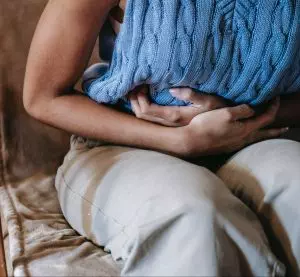
Diarrhea, bloody stool, fatigue, fever? These could be colitis symptoms. Ulcerative colitis is an inflammatory bowel disease (IBD) that causes swelling in the large intestine, abdominal pain, bloating and bloody diarrhea. Acupuncture and TCM can offer an alternative colitis treatment to help relieve ulcerative colitis symptoms.
Colitis is a gastrointestinal disease in which the colon—also known as the bowel, or the large intestine—becomes inflamed and can develop open sores, or ulcers.
Ulcerative colitis is the term for colitis that is caused by an autoimmune disorder. The immune system launches an attack on the tissues of the intestinal lining, causing inflammation and sores. It is similar to Crohn’s disease: an autoimmune disease that can affect any part of the digestive tract.
What causes colitis? There are several problems that can lead to abdominal pain and diarrhea, and sometimes it can be difficult to discover what is causing a person to have colitis symptoms.
Parasites, bacterial infections, or food poisoning can cause pain, inflammation in the colon, and diarrhea. For example, e coli bacteria, sometimes found in improperly cooked beef, can cause colitis symptoms. This is known as e colitis, or hemorrhagic colitis.
IBS (irritable bowel syndrome) symptoms can seem similar to those of colitis. People who suffer from IBS can have abdominal pain and diarrhea, urgency and mucus in their stool. However, IBS is considered a functional gastrointestinal disorder, not a disease. IBS does not cause permanent damage to the intestinal lining, while colitis can.
Ischemic colitis is a specific type of colitis caused by a blockage of blood flow to the intestine. This is more common in older adults, and can be the result of a blood clot in an artery, or low blood pressure due to heart failure or recovery from some major surgery. Some conditions, like lupus or sickle cell anemia, can restrict blood flow to the gastrointestinal tract. It could also happen due to a bowel obstruction caused by a tumor or hernia. Some medications can also restrict blood flow to the intestine.
TCM and acupuncture treatment, whether alone or as an adjunct to conventional treatment, can help relieve the symptoms of colitis by reducing inflammation in the intestine, helping to stop bleeding and helping to restore normal bowel movements.
Colitis Symptoms
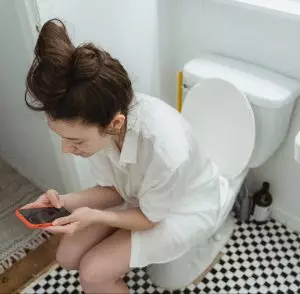
Ulcerative colitis symptoms can be mild at first and become more persistent and/or severe over time. Some common symptoms of colitis, or IBD symptoms, include:
- Loose stool, loose bowel movements, diarrhea
- Urgency to go to the bathroom, feeling like you have to poop all the time
- Feeling like you have to poop, but not being able to
- Bloody stool, bloody poop
- Mucus in stool
- Abdominal pain
- Abdominal cramps, cramping
- Rectal pain
- Fatigue, feeling tired all the time, no energy
- Fever
- Weight loss
Symptoms of ulcerative colitis can come and go, or “flare up” at times. When symptoms abate, this is called “remission.”
Children can have colitis, which may cause them to not grow properly.
Colitis Treatment
Testing for IBDs might start with some basic blood tests and a stool sample test to see if there are any bacterial or parasitic causes of diarrhea. If inflammation needs to be looked at more closely to discover its location and cause, a colonoscopy or sigmoidoscopy may be done. Imaging—X-ray, ultrasound, or MRI—may be used to show if there is some kind of obstruction of the intestine.
If testing and treatment have ruled out IBD and other potential causes, a tissue biopsy may be used to diagnose ulcerative colitis, the autoimmune form of colitis.
Generally, once colitis or inflammatory bowel disease has been diagnosed, the main goal is to reduce inflammation in the colon. Anti-inflammatory drugs will usually be prescribed. Anti-diarrheal medications and pain relievers provide some symptomatic relief.
Ulcerative colitis is usually treated with a combination of anti-inflammatories and immunosuppressants. Unfortunately, these types of medications can have significant side effects. Long term use of corticosteroids can cause bone loss and swelling, while immunosuppressants can stress the liver and pancreas.
Newer pharmacological treatments include “small molecules,” like Xeljanz, which act as anti-inflammatories and immunosuppressants. However, these drugs have been flagged for potentially causing heart problems, and maybe even cancer.
When medications and dietary changes don’t help enough, surgery to remove part of the large intestine may be sought.
Acupuncture and TCM offer an alternative treatment for colitis, which may help relieve symptoms without side effects.
Can Acupuncture Help Colitis?
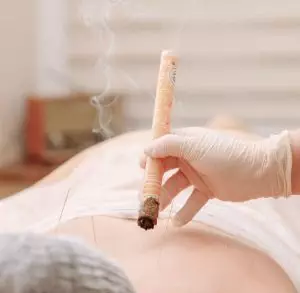
TCM herbs and acupuncture treatment are excellent modalities for helping to reduce inflammation. In the case of colitis and ulcerative colitis, the central problem is that the body is producing an inflammatory response in the large intestine that leads to pain and dysfunction. According to TCM theory, imbalances in the internal organs can cause heat, dampness, or blood stasis. In different people, the ways that colitis shows up may vary, depending on the pathogenic forces at work.
Acupuncture points to help relieve diarrhea, bloating, and bleeding in the colon will be combined with beneficial herbs to help clear heat and dampness. One study done in China showed that patients with ulcerative colitis who received acupuncture and herbal supplements in addition to conventional pharmaceutical treatments healed more quickly than those who did not receive TCM. They also reported feeling less anxiety and depression.
A systematic review of studies done regarding TCM for colitis concluded that acupuncture and herbs were effective compared to medical treatments.
Studies have shown that acupuncture can help balance the gut biome and help strengthen the intestinal walls.
Acupuncture has been shown to help people whose colitis is in remission to maintain better function.
TCM herbs, used in combination with conventional treatment, may help improve the healing of the mucosal lining of the intestine. One study showed that herbs helped stop bleeding from the colon in patients with ulcerative colitis.
Moxibustion has also been shown to help as a treatment for IBD, helping to relieve diarrhea, nausea, and abdominal cramping.
Acupuncture is believed, in part, to help regulate inflammatory bowel diseases by providing positive stimulation of the vagus nerve, which plays an important role in inflammatory responses.
Acupuncture Near Me for Ulcerative Colitis in Los Angeles and Santa Monica
Acupuncture can be an excellent adjunct to standard treatment for gastrointestinal disorders of all kinds, including: IBS, Crohn’s disease, Celiac disease, and Candida. At Art of Wellness, we have over 30 years of experience helping people with IBD and colitis to improve their quality of life.
*This article is for education from the perspective of Traditional Chinese Medicine only. The education provided by this article is not approved by FDA to diagnose, prevent, treat and cure human diseases. It should not stop you from consulting with your physician for your medical conditions. Traditional Chinese Medicine is based on Qi, which is an invisible force that usually cannot be observed by modern science. Because science focuses on testing ideas about the natural world with evidence obtained through observation, these aspects of acupuncture can’t be studied by science. Therefore acupuncture and Chinese herbs are often not supported by double-blind, randomized trials, and they are considered alternative medicine therapies in the United States.
How to Treat Aphasia With Acupuncture and TCM (Scalp Acupuncture)
By Qineng Tan, L.Ac., Ph.D.
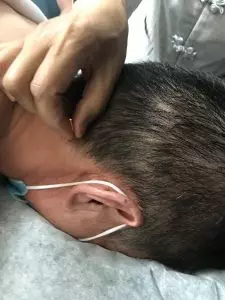
Difficulty speaking, reading or writing due to brain damage is known as “aphasia.” Different types of aphasia can develop after a person has a stroke or head injury. Aphasia can also be a symptom of dementia. Acupuncture—especially “scalp acupuncture”—can help a person regain brain function and speech.
Aphasia—sometimes called “dysphasia”— is a language disorder that occurs because a part of the brain that controls speech, comprehension, and communication is not functioning correctly. This is usually due to damage or pressure on that part of the brain.
Scalp Acupuncture, sometimes called “neuroacupuncture,” is a specific technique that combines Traditional Chinese Medicine and Western medical understanding of neurology. Acupuncture needles are used to stimulate points on the head, or scalp, that have a direct effect on brain cells.
Scalp acupuncture can be helpful in treating acute and chronic central nervous system disorders that cause aphasia, as well as cognitive difficulties, trouble with motor skills, and even paralysis.
Scalp Acupuncture can be used to help people regain brain function after having suffered a stroke or injury to the head. Aphasia is generally considered to be related to this type of damage, but speech problems and trouble with cognition and comprehension can often occur with other neurological disorders, too.
This type of acupuncture treatment can also help people with neurological conditions such as:
- Parkinson’s disease
- Multiple Sclerosis/MS
- Alzheimer’s disease
- Guillain Barre Syndrome
- Ataxia
- Bell’s palsy
- ADD/ADHD
Neurological disorders cause problems with the way the brain communicates information and instructions to the organs and limbs via the nervous system; this is what leads to a wide variety of language and movement disorders.
Scalp acupuncture can be used to help these conditions because it can stimulate malfunctioning brain cells to begin working properly again, encourage the growth of new brain cells, and reestablish connections between the brain and the rest of the central nervous system.
Acupuncture can help improve some of the most common symptoms of neurological disorders like Alzheimer’s, Parkinson’s, and MS, including:
- Aphasia
- Headaches
- Dizziness
- Fatigue
- Mood swings
- Depression
- Muscle spasms, stiff muscles
- Seizures
- Tremor
- Paralysis
Scalp acupuncture can be an effective form of integrative medicine to help people overcome these symptoms, whether they are recovering from a stroke or suffering from a neurological disorder.
What is Scalp Acupuncture?
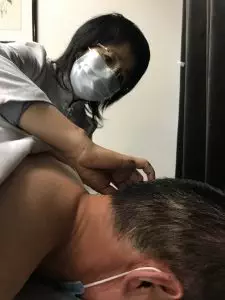
Acupuncture is one of several modalities used in TCM, which is a complete medical system with a history going back thousands of years. The stimulation of points on the head and/or scalp has always been used as a method for treating all types of symptoms and underlying conditions.
“Scalp acupuncture” is a term that refers to a more specific, contemporary acupuncture technique that combines ancient TCM knowledge with modern medical understanding of the anatomy of the brain and the way parts of the brain interact with the nervous system to control various bodily and sensory functions.
In Chinese Medicine, acupuncture points are usually chosen based on the theory of the meridians—channels along which Qi (energy) moves through the body. Along each meridian lie several points that connect organ systems and parts of the body. This concept of a network system of meridians is more metaphorical in nature, rather than based on actual physiology. In TCM we may consider that a problem in one part of the body is related to an imbalance in a (seemingly) different organ system. For example, anxiety and heart palpitations might be treated by needling a point on the head that is on the Stomach meridian.
In Western medicine, “somatotopic arrangement” describes the understanding of how parts of the brain, and particularly the nerve endings on the scalp, are arrayed in a pattern around the skull and correspond to different sensory functions, such as speech, visual perception, balance, and motor skills. With MRI technology, scientists have been able to “map” out how parts of the nervous system on the scalp correspond to parts of the body, like the feet, and the hands, etc.
With the practice of scalp acupuncture, we are combining these concepts and using acupuncture as a way of directly influencing parts of the brain, like the cerebral cortex, hypothalamus, cerebellum, etc. This can help both to heal parts of the brain that might be damaged due to a stroke, and to regulate functioning of those parts, so as to help restore proper functioning of motor activities and the senses.
This technique involves the insertion of small acupuncture needles into the tissues just beneath the surface of the skin on the scalp. Then, the needles may be be stimulated, either by manually twisting, or with electro-acupuncture (sometimes called “electro-stim”). Here, we attach small electrodes to the needles, and a mild to medium level of electric current flows to activate a vibration and/or rotation.
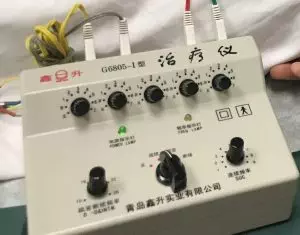
As part of the goal is to reactivate nervous system connections, the patient may be asked to be active during the treatment; that is, by moving the part of the body that is experiencing weak movement, or at least, to visualize or imagine themselves performing the movement.
One study of patients being treated with scalp acupuncture for aphasia showed that 46% showed “marked improvement,” while almost all patients showed some improvement.
In a study of scalp acupuncture for treatment of paralysis, all patients showed improvement, while 68% were cured.
While more research is needed, it is also believed that scalp acupuncture may be a good alternative therapy to help treat mental health issues, like depression, anxiety, and PTSD, as well as sleep disorders, like insomnia.
Scalp Acupuncture for Aphasia and Stroke Recovery in Los Angeles
At Art of Wellness, we have over 30 years of experience treating neurological disorders of all kinds. Our training in China gave us a thorough understanding of integrative medicine, using both TCM and Western medicine knowledge to provide the best possible outcomes for our patients. We have continued to grow and learn, while working closely with doctors and patients in Los Angeles since 1995. If you or someone you love is recovering from a stroke, or living with a chronic neurological condition, please consider trying acupuncture as an adjunct treatment.
*This article is for education from the perspective of Traditional Chinese Medicine only. The education provided by this article is not approved by FDA to diagnose, prevent, treat and cure human diseases. It should not stop you from consulting with your physician for your medical conditions. Traditional Chinese Medicine is based on Qi, which is an invisible force that usually cannot be observed by modern science. Because science focuses on testing ideas about the natural world with evidence obtained through observation, these aspects of acupuncture can’t be studied by science. Therefore acupuncture and Chinese herbs are often not supported by double-blind, randomized trials, and they are considered alternative medicine therapies in the United States.
How to Treat Bronchitis With Acupuncture and TCM
By Xiaomei Cai, L.Ac., Ph.D. & Qineng Tan, L.Ac., Ph.D.

Chest cold with a productive cough, shortness of breath, coughing up mucus? These could be acute bronchitis symptoms. Acupuncture and TCM herbs can provide an alternative bronchitis treatment to help relieve chest congestion and a chronic cough.
Bronchitis is a respiratory infection in which the bronchial tubes, or airways, become inflamed. It typically causes chest congestion, a wet cough, coughing up phlegm, and difficulty breathing. Acute bronchitis usually develops due to the same kinds of viral infections that cause the common cold or pneumonia.
Chronic bronchitis refers to long-term inflammation of the lungs and bronchial tubes that is not related to an infection. If a person has a cough with mucus that lasts for months, or happens year after year, it is considered chronic bronchitis. This can happen as a result of smoking, and/or exposure to air pollution.
Like emphysema, chronic bronchitis is considered a chronic obstructive pulmonary disease (COPD). There are other lung conditions that can cause symptoms similar to those of bronchitis, including: asthma, sinusitis, whooping cough (pertussis) and tuberculosis.
Acute bronchitis usually clears up within a few weeks, but the persistent cough may linger. Antibiotics do not help treat viral infections, so the treatment for bronchitis is usually just to help suppress the cough and reduce aches and pains.
TCM treatment with acupuncture and herbs can help relieve bronchitis symptoms without side effects. It can also help remove pathogens and blockages affecting the lungs, so that bronchitis doesn’t turn into a chronic, recurrent condition.
Bronchitis Symptoms
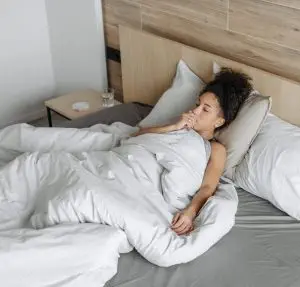
Acute bronchitis causes the airways of the lungs—the bronchial tubes—to swell, and the lungs to produce extra mucus. Coughing, with clear or yellowish phlegm, is the primary symptom of bronchitis.
The most commons symptoms of bronchitis include:
- Cough, phlegmy cough, cough with mucus, productive cough, persistent cough
- Chest soreness, tightness in chest, chest pain
- Fatigue, feeling tired
- Shortness of breath, trouble breathing, wheezing
- Sore throat
- Stuffy nose, runny nose
- Body ache, headache, back pain, muscle pain
- Low grade fever
Is bronchitis contagious? It is not so much bronchitis as a condition—that is, inflammation and congestion in the lungs—is contagious, as the virus or bacterial infection that caused bronchitis to develop is contagious for a period of time. The coughing may last for a while beyond the infectious period. Sleeping can be difficult, because the cough tends to worsen when a person lies down.
Bronchitis Treatment
When you seek treatment for acute bronchitis from a physician, it is generally treated in the same way as the common cold. Recommendations will include:
- Rest
- Increase fluid intake, drink more water
- Take OTC pain relievers
- Take expectorants or cough suppressants to manage coughing
- Use a humidifier or sit in a steamy shower room to help relieve congestion
These remedies may help to temporarily relieve symptoms while a person gets over the infection. However, some of these medications can cause side effects, and they do not do much to help prevent bronchitis from coming back the next time a virus is going around.
Chronic bronchitis, as a COPD, is considered a chronic illness that must be managed, so as to slow its progression. Quitting smoking is the first recommendation. Then, bronchodilators, steroids, and/or antibiotics may be prescribed to help open the airways, reduce inflammation, and prevent recurrent infections.
These medical interventions, too, can come with significant side effects. Corticosteroids, in particular, if taken over a long period of time, can cause liver damage.
Making a major lifestyle change, like getting rid of a nicotine addiction, is easier said than done.
Fortunately, acupuncture and TCM herbs offer a complementary medicine to help relieve bronchitis symptoms, treat the deeper root causes, and also help with quitting smoking, if necessary.
Can Acupuncture Help Bronchitis?
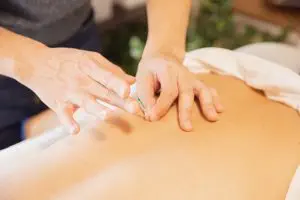
According to TCM theory, bronchitis is the result of pathogenic forces like Wind and Dampness affecting the lungs and other organs systems that are interrelated. An acupuncturist looks for the particular patterns of symptoms in each individual, and tailors acupuncture treatment and herbal supplements, according to which organ system patterns are involved. These may include:
- Lung dampness
- Lung deficiency
- Lung dryness
- Phlegm-heat obstructing lung
- Wind invasion
- Spleen Qi deficiency
- Spleen/Kidney Yang deficiency
- Qi and/or Yin deficiency
Multiple studies have shown that acupuncture treatment and herbal cough preparations can be even more effective than conventional medicines when helping to relieve post-infectious chronic coughing.
Studies have shown that acupuncture can help reduce bronchial inflammation and damage, relieve coughing and reduce phlegm production. It can also help boost immune function.
One study detailed how patients with chronic bronchitis, who had been taking steroids for years, were able to reduce or entirely stop their use of steroids after receiving acupuncture treatments for a few months.
Chinese herbs, used in combination, can help relieve bronchitis symptoms and work on other levels, too. They can help clear toxins from the tissues and promote regeneration of new, healthy tissue, and improve immunity, so that the next time a virus is going around, the body is better equipped to fight it off quickly.
Top 5 Tips for Getting Rid of Bronchitis Naturally
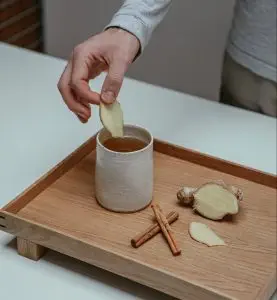
Getting acupuncture treatment and specific herbs for your condition will be helpful. In addition, you can help strengthen your lung health by practicing these habits:
- Avoid dairy products, which increase mucus production
- Drink warm herbal teas, fresh ginger tea, and lemon water to help stay hydrated and thin phlegm. Avoid caffeine and alcohol, which dehydrate you. Ginger helps reduce inflammation.
- Steam an asian pear until very soft, and eat like applesauce. This helps clear mucus.
- Breathing exercises can be helpful; ask your acupuncture practitioner to show you some good breathing techniques.
- Take Yin Qiao pills at the very first sign of a cough or sore throat. This is a traditional Chinese formulation that helps ward off colds and coughs if taken early.
Acupuncture Near Me for Bronchitis in West Los Angeles
When a respiratory infection turns into a nagging cough, or worse, into chronic bronchitis that keeps coming back, year after year, it is important to seek treatment. With acupuncture and TCM herbs, it is possible to recover from a bronchial infection more quickly and comfortably. With regular acupuncture “tune-ups,” you can end the cycle of a chronic cough.
*This article is for education from the perspective of Traditional Chinese Medicine only. The education provided by this article is not approved by FDA to diagnose, prevent, treat and cure human diseases. It should not stop you from consulting with your physician for your medical conditions. Traditional Chinese Medicine is based on Qi, which is an invisible force that usually cannot be observed by modern science. Because science focuses on testing ideas about the natural world with evidence obtained through observation, these aspects of acupuncture can’t be studied by science. Therefore acupuncture and Chinese herbs are often not supported by double-blind, randomized trials, and they are considered alternative medicine therapies in the United States.
How to Treat Anemia With Acupuncture and TCM
By Qineng Tan, L.Ac., Ph.D & Xiaomei Cai, L.Ac., Ph.D
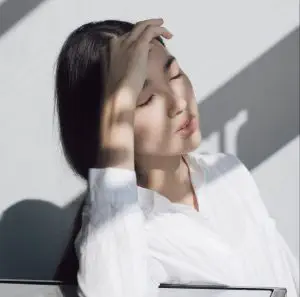
Tired, weak, and pale? These can be symptoms of Anemia. Whether anemia is due to deficiency of iron, or inherited, as with sickle cell anemia or thalassemia, TCM and acupuncture can provide an alternative or adjunct anemia treatment.
Anemia (sometimes spelled ‘anaemia’) is a broad term referring to blood disorders that cause people to either not have enough red blood cells, or to have red blood cells that don’t function properly. Red blood cells are made by the bone marrow, using iron, folic acid, and vitamin B12 as building blocks.
Red blood cells carry hemoglobin to organs and tissues throughout the body. Hemoglobin is a protein that contains iron. Hemoglobin picks up oxygen from the lungs and carries it to the rest of the body. If this process is disrupted, then cells in the body don’t get the oxygen they need.
Top 5 Types of Anemia
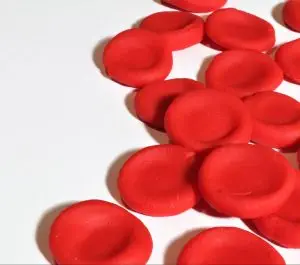
There are many different types of anemia. Some are genetically inherited. Others may manifest due to conditions like pregnancy, an injury, an illness like mononucleosis, or nutritional deficiencies. Some types of anemia are related to autoimmune disorders, such as lupus, Crohn’s, or Celiac disease. Anemia can also be caused by blood loss due to an accident or surgery, or internal bleeding. The most common types of anemia include:
- Sickle cell anemia
- Pernicious anemia
- Iron deficiency anemia
- Thalassemia
- Aplastic anemia
Sickle cell disease is an inherited condition in which some red blood cells form in an unusual shape, like a sickle or crescent. These cells have a harder time moving through the blood vessels, so blood flow can become slow or blocked.
Thalassemia is also inherited. With this condition, the body does not make enough hemoglobin.
Iron deficiency anemia occurs when a person doesn’t have enough iron to nourish their red blood cells, so they have low hemoglobin levels. This type of anemia can happen due to a loss of blood, or because a person’s digestive system isn’t absorbing enough iron from their food. Sometimes people develop this type of anemia during pregnancy, because a lot of iron is going to the growing fetus.
Low levels of Vitamin B12 and/or folate can also cause anemia. Pernicious anemia is a type of autoimmune disorder in which the digestive tract cannot properly absorb vitamin B-12 because immune cells are attacking the lining of the stomach. Megaloblastic anemia is another kind of anemia, where the red blood cells are too large, that happens due to a B12 deficiency, or lack of folate.
People can also develop a form of pernicious anemia after having a gastric bypass or other surgery in which a part of the stomach or small intestine is removed. This inhibits their ability to absorb nutrients during digestion.
Aplastic anemia occurs when the bone marrow cannot produce enough blood cells. Aplastic anemia is rare, but it may happen when a person has gone through chemotherapy or radiation treatment, had a reaction to some toxin or medication, or after a viral infection.
Aplastic anemia can also manifest as an autoimmune disorder, in which the immune system attacks the bone tissue. Fanconi anemia is a genetic condition that also affects the bone marrow’s ability to make red blood cells.
Top 10 Anemia Symptoms
What are the signs that you are anemic? Pallor, or pale skin, weakness and fatigue, dizziness, and headaches are some of the most well-known iron deficiency symptoms.
Other signs of anemia include:
- Fatigue, feeling tired all the time
- Muscle weakness
- Markedly pale skin, pallor, or yellow skin
- Shortness of breath, rapid breathing
- Changes in stool
- Dizziness, light-headed
- Palpitations, rapid heart rate
- Low blood pressure
- Feelings of irritability, anger, frustration, depression, anxiety
- Headaches

Other signs of low iron can include:
- bruising easily
- pounding or “whooshing” in the ears
- cravings for ice or clay
- brittle nails
- hair loss
- sore tongue
- enlarged spleen
If anemia worsens, low iron symptoms or low hemoglobin symptoms could include:
- fainting, passing out
- whites of the eyes look blue
- chest pain
Treatment for Anemia
Doctors will usually order a CBC test first to check for anemia. This can reveal how many red blood cells you have, and the shape of the cells. Tests can also show B12 and iron levels.
Iron supplements and high iron foods will be recommended. In more severe cases, iron may be supplied intravenously, or with a blood transfusion. Vitamin B12 shots or supplementation of folic acid and Vitamin C may also be recommended.
Genetic types of anemia like sickle cell disease and thalassemia may be treated with a bone marrow transplant.
Autoimmune related anemia, like aplastic anemia, is usually treated with blood transfusions, immunosuppressant medications and steroids, and ultimately, bone marrow transplant, or stem cell transplant.
Anemia is, for the most part, considered a chronic illness that can be managed with additional iron and other nutrients. TCM allows us to look more deeply at the root causes of anemia, and to help increase iron absorption by addressing deficiencies affecting the digestive tract.
Can Acupuncture Help Anemia?
In TCM, we see many conditions as occurring due to a deficiency of Qi (vital energy) and/or blood. Blood deficiency can be the result of excessive blood loss, as after an injury, or due to heavy menstrual bleeding, as when a person has uterine fibroids. It can also happen because the organ systems are not able to perform their roles in the production of blood. Blood stasis, which occurs when blood is not being moved or replaced properly, can also be a factor.
In TCM theory, blood is considered to be governed by the heart, stored in the liver, and produced by the spleen. TCM differentiates different patterns of blood deficiency according to which organ systems seem to be affected:
- Heart blood deficiency: restlessness, difficulty concentrating, memory problems, heart palpitations
- Spleen blood deficiency: weight loss, lack of appetite, mental fatigue
- Liver blood deficiency: irritability, dry, brittle nails, spasms
Acupuncture treatment for anemia may involve, then, using specific acupoints to help strengthen the Qi of the liver, stomach, and/or spleen.
The root cause of anemia is that the digestive tract is not able to absorb nutrients adequately. Acupuncture has been shown in studies to help increase iron absorption in the intestinal tract. In laboratory studies, acupuncture treatment was seen to increase levels of serum ferritin, a protein that carries iron in the blood.
Chinese herbal supplements for anemia can help to remove blood stasis, strengthen the spleen and heart, and provide nourishment for the production of blood cells.
One study showed that TCM herbs helped reduce mortality risk when used as an adjunct or alternative to medical therapies in patients with aplastic anemia.
Acupuncture Near Me for Anemia in Los Angeles and Santa Monica
Anemia can have an impact not only on your energy and physical well-being, but your mental health, as well. TCM treatment for anemia involves a combination of acupuncture, herbs, and nutrition that can help strengthen the process of blood production and transportation throughout the body, while also helping to relieve symptoms like dizziness, fatigue, headaches, and irregular heartbeat. The acupuncturists at Art of Wellness have over 30 years of experience helping patients overcome chronic conditions like anemia.
*This article is for education from the perspective of Traditional Chinese Medicine only. The education provided by this article is not approved by FDA to diagnose, prevent, treat and cure human diseases. It should not stop you from consulting with your physician for your medical conditions. Traditional Chinese Medicine is based on Qi, which is an invisible force that usually cannot be observed by modern science. Because science focuses on testing ideas about the natural world with evidence obtained through observation, these aspects of acupuncture can’t be studied by science. Therefore acupuncture and Chinese herbs are often not supported by double-blind, randomized trials, and they are considered alternative medicine therapies in the United States.
How to Treat Acne With Acupuncture and TCM
By Xiaomei Cai, L.Ac., Ph.D. & Qineng Tan, L.Ac., Ph.D.
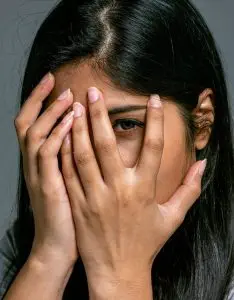
Acne breakout, pimples, blackheads? Painful cystic acne and acne scars can affect your confidence and even lead to depression. Acupuncture and TCM provide an alternative skin care option to treat hormonal acne and clear up blemishes.
What causes acne? Acne is a skin condition in which bumps on skin form when hair follicles become clogged with dirt and oil. Sebum, the natural oil produced by skin glands, builds up in the pores and causes blockages. Pimples may appear on the face or other parts of the body (back acne, chest acne, bumps on arms, pimples on scalp/scalp acne, etc.).
Acne is most common during the teenage years, but people of any age can experience skin breakouts. Acne is also influenced by fluctuations in hormones, reactions to cosmetics or foods, weather, and perhaps most commonly, stress.
Rosacea is another skin condition that typically causes redness, flushing, and visible blood vessels on the skin, but it can also cause red bumps to break out, similar to acne. This is known as “acne rosacea.”
Everyone gets a few pimples at some point in their lives. However, severe acne that causes scarring can have a serious impact on a person’s confidence in daily life, as well as being physically painful.
There are many types of products and acne medication available, both over the counter or with a prescription, including: benzoyl peroxide, retinol for acne cream, acne patch, and acne face wash.
Topical treatment for acne may clear blemishes on a skin-deep level. Acupuncture and other TCM skin treatments can help get rid of acne and other skin problems, like rosacea, dermatitis, and eczema by addressing the root causes: hormonal imbalances, inflammation, and stress.
Types of Acne
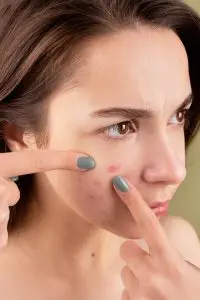
Acne blemishes can show up in different forms. The most commons types of acne include:
- Whiteheads – small, closed, white bumps that develop when a pore is clogged
- Blackheads – open bumps that are filled with oil and dead skin
- Red bumps on skin – papules are hard, red, inflamed bumps on skin
- Pustules – a papule that has a pus-filled tip
- Nodules – large, painful red bumps
- Fungal acne or bacterial acne – when red bumps are caused by bacteria or yeast clogging the follicles
- Acne rosacea – rosacea can cause acne-like breakouts in addition to red flushing
- Cysts or Cystic acne – large, painful, nodules that are deep down, under many layers of skin
Cystic acne is considered to be the most severe type of acne. The deep, inflamed cysts can get very big, last a long time, and leave permanent scars. Cystic acne may be genetic, as it tends to run in families.
Hormonal acne, which is also called “adult acne,” occurs because fluctuations in reproductive hormones like progesterone and estrogen and the stress hormone cortisol stimulate the overproduction of sebum. This kind of acne is most common among women in their 20s through their 40s.
Many women have breakouts that occur cyclically, coinciding with their PMS week or their period. Women may also experience pregnancy acne during the postpartum period. Women over 40 may have unexpected patches of pimples during perimenopause and menopause. Acne is also common among women with PCOS (polycystic ovarian syndrome).
Advanced Dermatology Acne Treatment
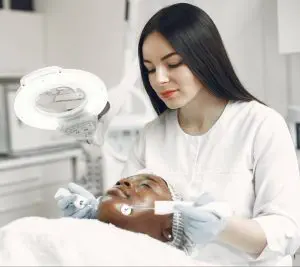
Dermatologists have tools that allow them to help remove pimples, known as acne extraction or blackhead extractions. Injections of corticosteroids can help reduce inflamed blemishes. Laser resurfacing can help minimize acne scarring.
A dermatologist can also provide acne medication. Cystic acne and hormonal acne will usually be treated with oral birth control pills to help manage hormone levels. Spironolactone is also sometimes prescribed; this is a diuretic, usually used to treat high blood pressure, that also has an effect on the hormones that control oil secretions.
Isotretinoin, also known as Accutane, is a medication used to treat severe acne, cystic acne, or nodules. Antibiotics are usually prescribed to help clear bacterial acne or fungal acne.
Many of these courses of treatment can cause unwanted side effects, and they do not get to the root cause of the hormone imbalance or internal toxicity.
TCM and acupuncture provide a way to get rid of acne that works from the inside out.
Can Acupuncture Help Acne?
According to TCM theory, skin problems reflect imbalances that originate deeper in the body. Heat and dampness are pathogenic forces that can take root in the organ systems. When heat “overflows” due to imbalances in the digestive or reproductive organs, the body tries to release some of the excess by allowing it to erupt out of the skin.
Acupuncture for acne can both help at the deeper, root level and on the surface of the skin.
We use meridian acupuncture points to target the internal organs that are creating toxic levels of heat or producing too much of some hormone. Then, we also use needles to stimulate the localized areas of the skin that are affected by the breakout and encourage healing.
Acupuncture treatment for acne will often focus on clearing heat from the stomach, intestines, liver, and lungs. This will help lead to fewer breakouts.
Acupuncture needles can be placed on the face where blemishes occur. The tiny “wounds” created by the very thin needles bring blood flow to the area and encourage the body’s repair and rebuilding mechanisms. The thin needles create a micro-trauma that brings blood flow to the area and encourages the body’s repair and rebuilding mechanisms to kick in. This is why acupuncture is also effective as an anti-aging treatment and a good alternative to botox injections.
One study showed a 94% effective rate for patients given 10 sessions of acupuncture for acne. A systematic review of acupuncture treatment for acne concluded that TCM offered an alternative with fewer side effects than conventional medical treatment.
TCM skin care for acne is highly individualized. An acupuncturist finds clues about which organ system is out of balance by observing the placement and appearance of recurrent breakouts, in addition to other symptoms related to digestion, hormone cycles, and emotional health. Cupping is another TCM treatment that can help draw out toxins and excess heat and improve circulation. Herbal supplements and dietary recommendations will be based on each person’s individual situation.
Top 3 Tips to Get Rid of Acne Naturally

Reducing stress is probably the most important thing you can do to help stop breakouts from happening. It is also generally advisable to avoid or limit spicy or greasy foods. Here are some of our best tips for clear skin.
- Start your day by drinking a cup of warm water with slices of lemon.
- Eat cooling foods and avoid foods that produce heat. Melons, mung beans, and radishes are top choices, along with lots of greens and purple-blue berries and plums.
- Try a homemade skin mask made from cooked, mashed dandelion greens. Apply for 20 minutes to get rid of blemishes and redness. Dandelion is a natural antibacterial and antifungal herb and is also good for the liver.
Acupuncture Near Me for Acne in West Los Angeles
Acne affects almost everyone at some point in their life. Breakouts can have a negative impact on your self-esteem, especially when we live in a culture that is so focused on appearances. The best acne treatment involves reduction of stress and inflammation, good nutrition, and restoring internal balance. At Art of Wellness we have over 30 years of experience helping patients heal skin conditions of all kinds.
*This article is for education from the perspective of Traditional Chinese Medicine only. The education provided by this article is not approved by FDA to diagnose, prevent, treat and cure human diseases. It should not stop you from consulting with your physician for your medical conditions. Traditional Chinese Medicine is based on Qi, which is an invisible force that usually cannot be observed by modern science. Because science focuses on testing ideas about the natural world with evidence obtained through observation, these aspects of acupuncture can’t be studied by science. Therefore acupuncture and Chinese herbs are often not supported by double-blind, randomized trials, and they are considered alternative medicine therapies in the United States.